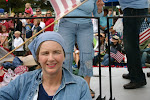Vintage Concert Review: Joan Baez in 1986
What ideally becomes a legend like Joan Baez the most should be a concert that demonstrates just how much she's musically accomplished over her amazingly long and varied career. She played an hour and fifteen minutes at the Universal Amphitheater this week, which would have been sufficient for most artists but she's capable of much more.
Baez as an entertainer has been placed by the media into some neatly labeled boxes: sweet-voiced folksinger, champion of controversial causes, icon from the past. Her song set, however, only reflected a portion of her style. When someone shouted a request, she responded, "Don't worry, I've been doing that one for a quarter of a century." Unfortunately, however, she gave her music from that period very little time--she did the silly fifties' rocker, "Little Darling," but none of the classic folk that made her a legend in the first place.
Baez may be a legend because she makes the old seem new and she keeps trying fresh musical approaches, but even considering the variey of her set, she needs a longer program to adequately demonstrate that. Her song selections this evening stepped into the midst of contemporary popular music. She juxtapositioned "No Woman No Cry" (reggae) up against U2's poetic "MLK," and that up against a couple of contemporary folksongs--"Recently" and "Fairfax County"--that are relatively new to her. She found space for two of her biggest hits, "Dixie" and "Diamonds and Rust," but not "Love is Just a Four-Letter Word." She encored with the R&B of Stevie Wonder's "Clap Your Hands" but missing was her interpretation of the alt-rock "Shout" that she sang so successfully on her tour for Amnesty International recently.
This range of musical stylings was made possible by Baez' legendary soprano but also by her guitar-playing, simple but worthy of showcasing even songs that were originally heavily orchestrated. (Pianist Ceasar Casino accompanied her without overpowering her playing.) Her style remains folk at its base, made very apprent when she brought back her two support acts, Don McLean and Livingston Taylor, for Peter Gabriel's "Biko." Even though she was singing as part of a trio with these guys who are stars in their own right, her voice and guitar remained dominant. The folksiness of the arrangement came through as Baez emphasised the line, "A man is dead" rather than copying Gabriel's haunting soaring coda of "Biko, Biko."
Baez as a legend who remains relevant after three very diverse decades was obvious tonight but how and why she came to occupy the status she holds in American music wasn't. Her audience doesn't need to be convinced again and again how she remains relevant (and her most detracting critics will never admit she is, anyway). Now that she's shown us how she's much more than simple nostalgia, she needs to mount a tour that will allow audiences to savor the experience of her traditional folk and topical protest side-by-side with current pop songs, strummed out accoustically, and if she takes two or three hours to take us on that musical journey, then it will all be part of her still-becoming legend.


0 Comments:
Post a Comment
Subscribe to Post Comments [Atom]
<< Home